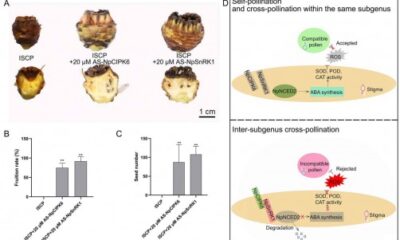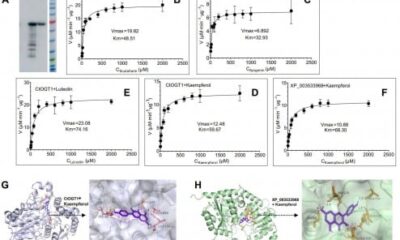Science
Engineered Microbial Communities Enhance Crop Growth and Health

A recent study published in Horticulture Research reveals that engineered synthetic microbial communities, known as SynComs, can significantly enhance crop health and mitigate soil-borne diseases. Researchers from the Institute of Subtropical Agriculture at the Chinese Academy of Sciences conducted the study, showcasing a novel biocontrol strategy that could transform agricultural practices.
The research indicates that utilizing tailored microbial combinations can not only promote plant growth but also provide a natural defense against harmful pathogens present in the soil. By fostering beneficial microorganisms, the study aims to offer a sustainable alternative to chemical pesticides, addressing environmental concerns associated with traditional farming methods.
Significant Findings and Implications
The team’s findings highlight the potential of these engineered microbiomes to improve crop resilience under various environmental conditions. In trials, crops treated with SynComs showed marked increases in growth rates compared to those grown in untreated soil. This improvement is attributed to enhanced nutrient uptake and better overall plant health.
According to the researchers, these microbial communities can effectively suppress specific soil-borne pathogens that threaten agricultural productivity. The implications of this research extend beyond just crop yields; they suggest a pathway towards more sustainable agricultural practices that could benefit ecosystems and food security globally.
Future Directions in Agricultural Research
The successful application of SynComs in crop management presents an exciting frontier in agricultural research. Researchers emphasize the importance of continuing to explore the interactions between plants and their microbial environments. Future studies will focus on optimizing these communities for different crops and soil types, ensuring that the benefits can be widely applied across various agricultural systems.
As the global population continues to rise, the demand for innovative solutions to enhance food production while minimizing environmental impact becomes increasingly critical. The findings from this study provide a promising step toward achieving these goals, positioning engineered microbiomes as a key player in the future of sustainable agriculture.
In summary, the research conducted by the Institute of Subtropical Agriculture opens new avenues for crop health management, potentially revolutionizing how farmers approach soil health and disease control. The commitment to developing sustainable agricultural practices is more important than ever, and the successful implementation of SynComs could play a vital role in this endeavor.
-

 Technology5 months ago
Technology5 months agoDiscover the Top 10 Calorie Counting Apps of 2025
-

 Health3 months ago
Health3 months agoBella Hadid Shares Health Update After Treatment for Lyme Disease
-

 Health3 months ago
Health3 months agoErin Bates Shares Recovery Update Following Sepsis Complications
-

 Technology4 months ago
Technology4 months agoDiscover How to Reverse Image Search Using ChatGPT Effortlessly
-

 Technology6 days ago
Technology6 days agoOpenAI to Implement Age Verification for ChatGPT by December 2025
-

 Technology1 month ago
Technology1 month agoDiscover 2025’s Top GPUs for Exceptional 4K Gaming Performance
-

 Technology3 months ago
Technology3 months agoElectric Moto Influencer Surronster Arrested in Tijuana
-

 Technology5 months ago
Technology5 months agoMeta Initiates $60B AI Data Center Expansion, Starting in Ohio
-

 Technology5 months ago
Technology5 months agoRecovering a Suspended TikTok Account: A Step-by-Step Guide
-

 Health5 months ago
Health5 months agoTested: Rab Firewall Mountain Jacket Survives Harsh Conditions
-

 Health3 months ago
Health3 months agoAnalysts Project Stronger Growth for Apple’s iPhone 17 Lineup
-

 Lifestyle5 months ago
Lifestyle5 months agoBelton Family Reunites After Daughter Survives Hill Country Floods













